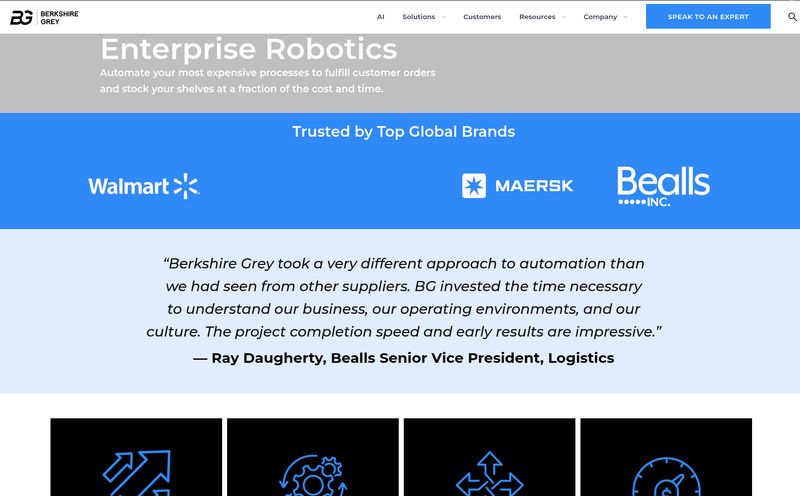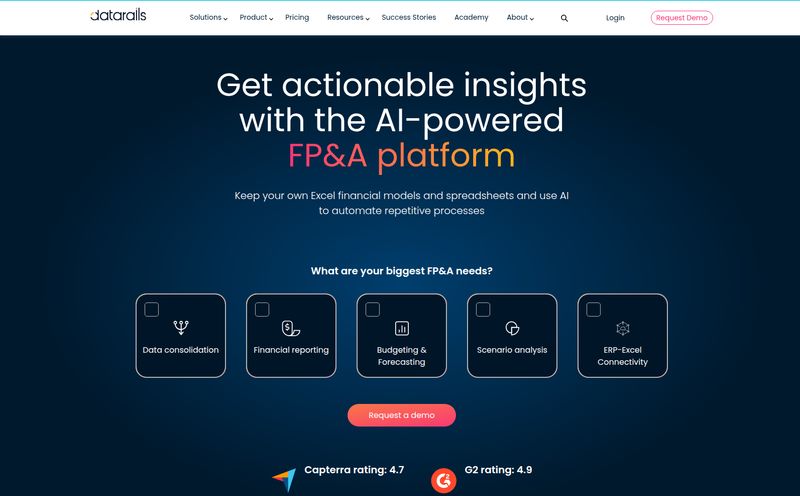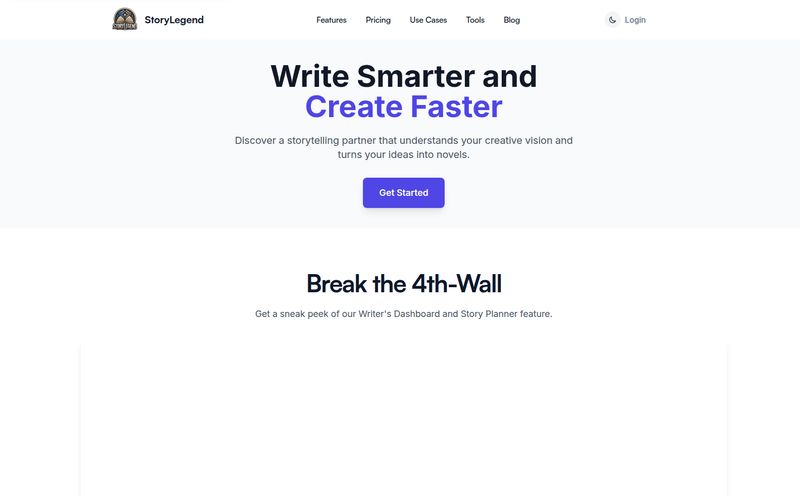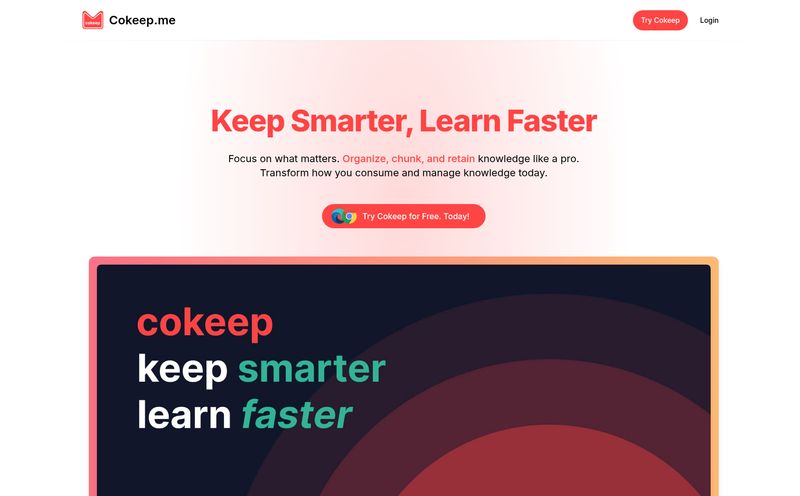If you’re a therapist, a speech pathologist, or an OT, what’s the one thing that makes you want to tear your hair out after a long day of sessions? I’ll bet you a month’s worth of coffee it’s the paperwork. The progress notes. That seemingly endless pile of SOAP, DAP, or BIRP notes that stands between you and your evening.
For years, we’ve just accepted it as the cost of doing business. The necessary evil. But with the AI boom that's taken over... well, everything, a new category of tools has started popping up, promising to slay this documentation dragon for us. One of the big names making waves is AutoNotes. The promise is seductive: save 7+ hours a week on clinical notes. But as someone who's seen a million 'game-changing' tools over the years, my first reaction is always a healthy dose of skepticism. So, I decided to take a proper look. Is this the AI scribe we’ve been waiting for, or just another tech fad?
So, What Is AutoNotes, Really?
On the surface, AutoNotes markets itself as an AI tool for therapists to generate progress notes and treatment plans. Simple enough. But looking a bit closer, it's trying to be more than just a fancy macro. The company calls it a “complete clinical documentation system,” and I think that’s a better description. It’s not just about spitting out a paragraph; it’s designed to integrate into your workflow, from charting clients to generating entire treatment plans.
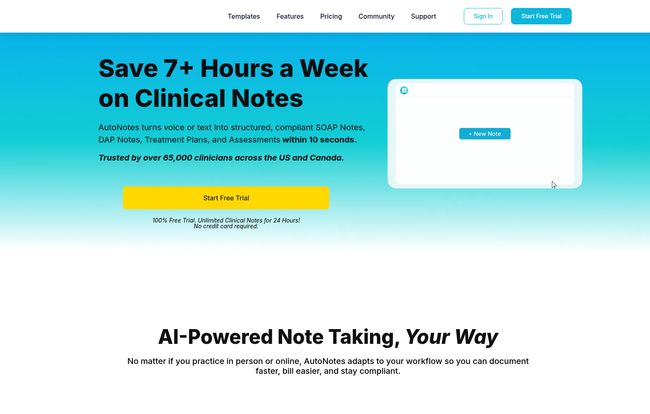
Visit AutoNotes
It’s built specifically for mental health, speech, and occupational therapists. This isn't some generic AI writer like ChatGPT that you have to painstakingly train on the difference between cognitive distortions and a client just having a bad day. It's designed with our specific, often complicated, needs in mind. And maybe most importantly, it's built to be HIPAA compliant, which is the first, second, and third question any of us should ask before letting a new piece of tech anywhere near Protected Health Information (PHI).
How It Works: The Nitty-Gritty of the Workflow
Alright, so how do you go from a 50-minute session to a perfectly formatted note in seconds? AutoNotes offers a few paths, which I appreciate. Not everyone works the same way.
Your main options are:
- Listen and Capture: You can actually have it listen to your sessions (telehealth or in-person). It captures the audio, and you get a transcript and a draft note. I know, I know, the privacy alarms might be ringing for some, but it’s all done through a HIPAA-compliant BAA. Still, this requires a level of comfort with tech in the room.
- Dictate or Upload: This feels like the sweet spot for many. After your session, you just dictate your thoughts. Ramble on about the client's presentation, your interventions, their response. You don't have to be formal. Just get the raw data out of your head. You can also upload an existing audio file if you prefer recording on your phone. The AI then takes your verbal brain-dump and structures it into a coherent note.
- Free Text Entry: Or, you can just type your messy, bullet-pointed thoughts into a text box and let the AI clean it up. It’s like having an editor on standby to turn your shorthand into professional documentation.
Whichever path you choose, the platform claims to turn it into a formatted note in your preferred style (SOAP, DAP, etc.) in under 90 seconds. A bold claim, but if it holds up, that's a massive time-saver.
The Features That Genuinely Matter
A lot of SaaS platforms throw a kitchen sink of features at you. I’m more interested in the ones that actually solve a problem. Here’s what stood out to me in AutoNotes.
AI-Generated Notes That Speak Your Language
This is the main event. The ability to generate SOAP, DAP, and other common note formats is its bread and butter. From the looks of it, it's not just filling in blanks. It’s synthesizing the information you provide. The goal is a note that’s not just complete but also clinically sound, capturing the 'golden thread' that connects a client's diagnosis, treatment plan, and session-by-session progress. This is what auditors and insurance panels look for, and honestly, it’s what good therapy is all about.
More Than Just Notes: Treatment Plans & Charting
I was pleasantly surprised to see this wasn't just a one-trick pony. Generating an initial treatment plan is another one of those time-sucking tasks. AutoNotes can help draft these based on intake information, saving a huge amount of setup time. This integration is smart. Your daily notes should always tie back to the overarching treatment plan, and having both in one system just makes sense. It helps you stay organized and clinically aligned without having to juggle multiple documents or systems.
That All-Important HIPAA Compliance
I’m mentioning it again because it’s that important. Any tool that handles PHI must be HIPAA compliant, full stop. AutoNotes states they are, and that they will sign a Business Associate Agreement (BAA). For anyone in private practice or working in an agency, this is a non-negotiable checkbox. It shows they understand the gravity of the data they're handling, which builds a lot of trust. A tool without this is just a toy; a tool with it is a professional instrument.
Let's Talk Money: A Breakdown of AutoNotes Pricing
Okay, the big question. What does it cost to buy back all this time? The pricing structure is tiered, which is pretty standard. I've put it into a simple table to make it easier to digest. They offer both monthly and annual billing, with a nice discount for the yearly commitment.
| Plan | Price (Annual / Monthly) | Who It's For | Key Features |
|---|---|---|---|
| Basic | $0 / month | Students or very light use | 30 notes/mo, Dictation |
| Essential | $21 / $25 | Solo clinicians starting out | 125 notes/mo, Dictation |
| Premium | $42 / $49 | Moderate caseloads | 300 notes/mo, Session Recordings |
| Ultimate | $84 / $99 | High-volume clinicians | Unlimited Notes, Session Recordings |
| Group Practice | Contact Sales | Organizations with unique needs | Unlimited Notes, Custom Templates, Team Management |
My take? The Basic plan is a perfect, no-risk way to see if the workflow even fits your style. The Essential plan at $21/mo (billed annually) feels like the sweet spot for most solo practitioners. 125 notes a month covers a caseload of about 30 clients, which is pretty substantial. The higher tiers are for the real power users, and the Group Practice plan is where you get the goodies like custom templates and team management, a point we'll come back to.
The Not-So-Shiny Parts: A Balanced View
No tool is perfect. If a review doesn't have a 'cons' section, it's not a review; it's an advertisement. So, let’s be real for a minute.
First, there's the philosophical debate about relying on AI. Could it make us lazy? Could we lose some of our own clinical insight by outsourcing the summarization? It's a valid concern. I see AI as an assistant, not a replacement. You're still the clinician. You still have to review, edit, and sign off on the note. The AI is there to do the tedious structural work, not teh clinical thinking.
Second, this isn’t a magic wand. You still have to do the work of dictating or summarizing your session. It doesn't read your mind. It rearranges and refines your input. It saves time on the structuring and writing, not on the recalling and thinking. That's an important distinction.
Finally, and this is a common gripe I have with SaaS models, some of the best features are locked behind the most expensive plan. The ability to create custom templates and get team management tools is only available on the 'Contact Sales' Group Practice plan. For a solo practitioner who has a very specific note-taking style they've perfected over years, that could be a significant drawback.
Frequently Asked Questions About AutoNotes
Is AutoNotes really HIPAA Compliant?
Yes. They state they are HIPAA compliant and will sign a Business Associate Agreement (BAA), which is the legal instrument required to ensure protected health information (PHI) is handled securely.
How is this different from just using ChatGPT?
Three big ways: HIPAA compliance, specialized workflow, and security. ChatGPT is not inherently HIPAA compliant for clinical work. AutoNotes is built with security in mind and provides specific templates (SOAP, DAP) and a workflow (dictation, uploading) designed for therapists, not a general-purpose chatbot.
Can I customize my note templates to match my style?
Yes, but this feature is currently reserved for the Group Practice plan. For the other tiers, you'll be using the standard (but comprehensive) templates provided by AutoNotes like SOAP and DAP.
Does AutoNotes work for group practices?
Absolutely. They have a dedicated "Group Practice" tier designed for organizations. This plan includes team management features, an account manager, and custom templates to ensure consistency across all clinicians in the practice.
Is there a free trial or a free version?
Yes, there's a "Basic" plan that is completely free. It gives you 30 notes per month, which is more than enough to test the platform and see if it fits into your daily routine before committing to a paid plan.
Final Thoughts: Is AutoNotes Worth the Investment?
So, here’s my final take. After years of seeing tools that promise the world, AutoNotes genuinely feels like a step in the right direction. It tackles one of the most universally despised parts of being a therapist with a smart, modern solution.
It’s not a self-driving car for your therapy notes; you still need to have your hands on the wheel. Think of it more like an incredibly advanced cruise control system for your documentation. It handles the boring, repetitive parts of the drive, letting you focus on the important stuff—like the actual road ahead. It won't do the clinical thinking for you, but it will give you back the hours you used to spend formatting and typing.
For a solo practitioner drowning in paperwork, the Essential plan seems like an absolute bargain for the time and sanity it could restore. If you’ve ever finished a long day of sessions and just stared at a blank page, feeling completely drained, a tool like AutoNotes might just be the partner you’ve been looking for. It's a solid investment in what matters most: more time for your clients, and more time for yourself.
